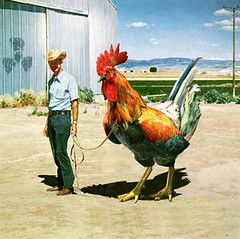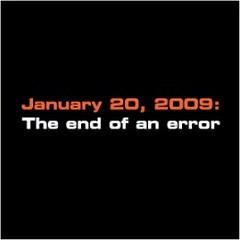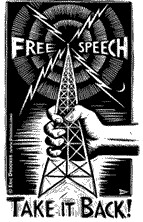Here We Go Again
The Lap-Dog Function of the Media
Salon: Iran and Iraq, Anonymously (2/12/07) by Tim Grieve
In an August 2004 retrospective on journalism in the run-up to the Iraq War, Washington Post editor Leonard Downie Jr. was asked to explain how two stories that called into question the case for war wound up buried deep inside his newspaper. His answer, at least in part: The stories relied on anonymous sources. So what's on the front page of the Washington Post today? A 2,600-word story linking Iran to weapons that are killing U.S. soldiers in Iraq—a 2,600-word story that is based almost entirely on unnamed sources. We say "almost entirely" because the Post's Joshua Partlow does quote one official by name: Labeed M. Abbawi, an Iraqi deputy foreign minister, who says that it is "difficult" to "accept whatever the American forces say is evidence" because the Americans won't speak openly.The rest of the story? The part that makes an Iran-Iraq link? Every bit of it comes from unnamed sources, some of whose identities the Post itself doesn't even know.
(Ad-viewing required.)
See also Editor & Publisher: Washington Post Joins New York Times in Trumpeting 'Anonymous' Claims on Iranian Weapons in Iraq (2/11/07) by Greg Mitchell.
The Associated Press,.. Reuters and others also reported on a briefing in Baghdad on Sunday, agreeing beforehand to the condition that none of the three U.S. officials taking part could be named or even described closely.
See also A Tiny Revolution: New York Times Reveals 'Reporter' Michael Gordon Actually Voice-Activated Tape Recorder (2/10/07) by Jonathan Schwarz.
The Times requires only what the "U.S. Says" to merit a front-page headline about how the "Deadliest Bomb in Iraq Is Made by Iran"—compelling Schwarz to lampoon correspondent Gordon's "literally inhuman" lack of skepticism.
"I'm not sure why everyone didn't figure this out before now," said [Executive Editor Bill] Keller, pointing to the fact that, in Gordon's 26-year career, all of "his" stories have consisted entirely of transcribed statements by anonymous government officials. [Managing Editor Jill] Abramson said the paper had decided to acknowledge Gordon's identity because—after the tape recorder's front page story today,"...there "was no place left to take the joke." Keller described how he and Abramson "really had a good laugh" while editing the Iran story, which is based on the following sourcing: "U.S. Says...United States intelligence asserts...reflects broad agreement among American intelligence agencies...military officials say...The officials said...Administration officials said...they assert...Other officials believe..."
See also Huffington Post: 'People Without Names' (PWN) Using New York Times to Escalate Tensions With Iran (2/10/07) by Mark Weisbrot & Robert Naiman.
The New York Times article provides no evidence for its reported allegations.... The 1900-word article offers no quotes from any experts who might question the allegations made by PWN, although there are many who would. Some readers might remember the author of the article, Michael R. Gordon, from the reporting prior to the Iraq war. His most notorious contribution was an article of September 8, 2002 entitled "U.S. Says Hussein Intensified Quest for A-Bomb Parts," co-authored with Judith Miller.










0 Comments:
Post a Comment
<< Home